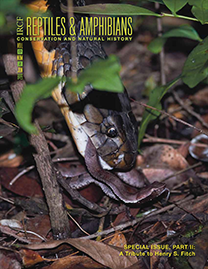Turtles in the Dust
Effects of Hands-on Scientific Training on a Group of Behaviorally At-risk Students’ Knowledge and Empathy
DOI:
https://doi.org/10.17161/randa.v17i2.16090Abstract
We taught a group of behaviorally at-risk students lessons on box-turtle biology and natural history before translocating hatchling Ornate Box Turtles (Terrapene ornata ornata) to a nature area adjacent to their school. The students then assisted with data collection and ultimately used telemetry to re-locate the turtles and independently collect data. Each student in the experimental group was given a questionnaire prior to beginning and again after completion of the program, with questions covering box-turtle biology, natural history, and empathy toward animals. Students in a control group were given the same questionnaire at similar times. Students in the experimental group felt they improved their knowledge concerning box-turtle biology and natural history after training, whereas control group students did not. Neither group, however, showed a change in empathy between the pre- and post questionnaires. Incorporating behaviorally at-risk students in research projects may enable researchers to complete projects while at the same time involving an often-neglected portion of the population.
Downloads
Published
Issue
Section
License

This work is licensed under a Creative Commons Attribution-NonCommercial 4.0 International License.
Copyright is held by the authors. Articles in R&A are made available under a Creative Commons Attribution-NonCommercial 4.0 International license.

